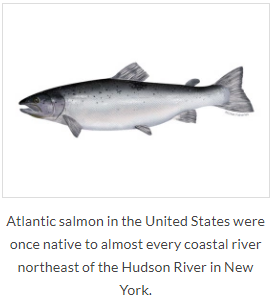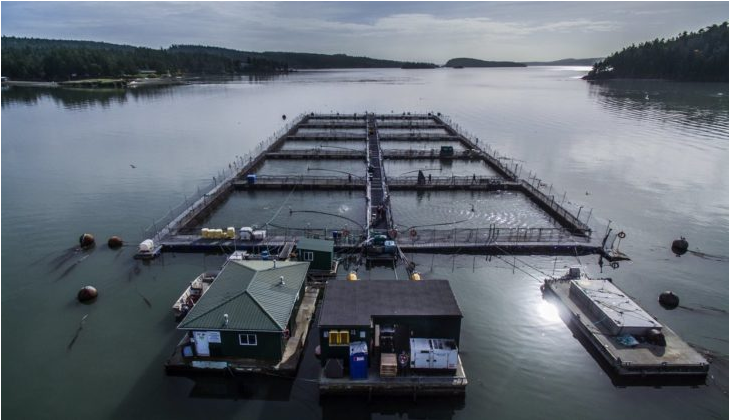Washington State Public Lands Commissioner Hillary Franz is celebrating the fact that Cooke Aquaculture has agreed to pay a $332,000 fine to the Washington Department of Ecology as a result of an accidental release of tens of thousands of farmed Atlantic salmon into Puget Sound. Cooke agreed to pay the fine with the understanding that the bulk of the money would be used to enhance northwest fisheries.
Like sharks smelling blood in the water, Franz’s supporters posted comments on her Facebook page demanding stiffer penalties, higher fines, and an immediate ban on aquaculture operations in Washington state. Sample comments include,
“It’s time to force Cooke Aquaculture out of Port Angeles”
“Not remotely enough! The company should be removed from ALL OUR WATERS!! NOW!!”
“Cancel all farmed fish pen leases now!”
“I would like to see them fined more and gone from our waters!”
Aquaculture operators have been farming Atlantic salmon in the Pacific Northwest since 1971. The Canadian fish farming industry has grown to nearly ten times the size of Washington’s. Government oversight, strict regulations, and increasingly stiff financial penalties have not prevented numerous accidental releases from aquaculture operations on both sides of the border. Over the past 40 years, Canadian and U.S. aquaculture businesses have been responsible for the escape of nearly a million Atlantic salmon into the Pacific ocean.
Statement from Cooke Aquaculture:
“Cooke Aquaculture Pacific was not interested in going through the hearing, putting additional stress on our employees, and reliving the regretful events of August 2017. When presented with the opportunity to dedicate 80% of the penalty ($265,600 USD) to a supplemental environmental project, Cooke made the decision to not litigate the penalty amount, and instead dedicate its resources to a project that will directly result in fisheries enhancement in the North Puget Sound region. Cooke is actively working on identifying such a project and partners in enhancing fisheries in North Puget Sound.”
Ironically, planned releases of Atlantic salmon were once considered a good idea. Federal authorities working with WDFW attempted to release Atlantic salmon into northwest waters back in 1981. All of the fish died and the project was scrapped.
 While early research indicated that Atlantic salmon would not survive in cold Pacific waters in the wild, that assumption has since been proven wrong. Marine biologists have become increasingly concerned that surviving Atlantic salmon escaping from fish farm pens could potentially out compete native stocks and/or hybridize with Pacific salmon. By 2003, Canadian authorities had already identified wild Atlantic salmon populations in coastal waters from Vancouver Island all the way up to Alaska. Free ranging Atlantic salmon were also identified in 81 streams and rivers in British Columbia.
While early research indicated that Atlantic salmon would not survive in cold Pacific waters in the wild, that assumption has since been proven wrong. Marine biologists have become increasingly concerned that surviving Atlantic salmon escaping from fish farm pens could potentially out compete native stocks and/or hybridize with Pacific salmon. By 2003, Canadian authorities had already identified wild Atlantic salmon populations in coastal waters from Vancouver Island all the way up to Alaska. Free ranging Atlantic salmon were also identified in 81 streams and rivers in British Columbia.
Obviously, while Cooke’s 2017 accidental release of Atlantic salmon is regrettable and a violation of state regulations, the cat, so to speak, has been out of the bag for a long time.
Five species of Pacific salmon thrive in the waters off of the western US and Canadian coasts: chinook (also called king), coho, pink, sockeye, and chum salmon. Ecological effects caused by escaped Atlantic salmon added to the mix are still unknown, but could be either good or bad, depending on who you talk to.
The potential for hybridization between Atlantic salmon and Pacific species appears to be extremely unlikely. Multiple attempts by researchers to hybridize Atlantic salmon with Pacific varieties have repeatedly failed. If researchers were unable to successfully hybridize the species in controlled hatchery conditions, it is highly unlikely that Atlantics will hybridize with any of the Pacific species in the wild. However, hybridization does remain a possibility.
 .
.There is a potential upside to having a growing population of “wild” Atlantic salmon in Pacific waters. Commercial salmon fisheries off the New England coast were forced to close in 1948 after nearly a century of over harvesting. Atlantic salmon are currently listed as a fully protected species under the Endangered Species Act. All Atlantic salmon currently found on grocery store shelves have been raised in aquaculture pens. While commercial fishing for wild Atlantic salmon remains strictly prohibited, salmon populations along the east coast are recovering thanks to habitat conservation and hatchery augmentation efforts. The addition of a viable population of Atlantic salmon in Pacific waters may help insure survival of the Atlantic species.
Species resiliency is a major concern for wildlife biologists who have been researching the effects of possible climate and temperature changes on various habitats and species. In light of climate unpredictability and our current limitations for making accurate climate predictions, adding yet another type of salmon that has, as one marine biologist put it, “evolved diverse life histories and populations to deal with environmental variability and uncertainty”, [see end notes] may actually help insure that regional salmon stocks are more resilient to any potential changes in our local environmental or climatic conditions.
Puget Sound’s resident Orca and sea lion populations will certainly enjoy the additional food source. While biologists may insist on referring to Atlantic salmon as an “invasive species”, the Orcas simply don’t care. It all tastes good to them. However, if we want to continue to see affordable farm raised Atlantic salmon at our local grocery stores, we’d better not let Hillary Franz and Gov. Inslee succeed in putting an end to fish farms in Washington State. But it may be too late to change course.
Legislation signed by Gov. Inslee in 2018 will phase out Washington’s Atlantic salmon aquaculture businesses by 2022 even though current leases do not expire until 2025.
Cooke Aquaculture spokesman Joel Richardson released a statement saying the company will comply with the phase out. Cooke will continue to operate Atlantic salmon farming businesses in Maine, Virginia, Europe, South America, and of course, Canada.
It’s your loss, Washingtonians.
Sources for this article:
“View of Common Future, Different Policy Paths? Managing the Escape of Farmed Atlantic Salmon in British Columbia and Washington State”– Gabriela Pechlaner; Murray B. Rutherford – https://ojs.library.ubc.ca/index.php/bcstudies/article/view/692/738
“Natural Climate Insurance for Pacific Northwest Salmon and Salmon Fisheries:
Finding Our Way through the Entangled Bank” – Nathan Mantua; Robert Francis –https://www.researchgate.net/publication/228648573_Natural_Climate_Insurance_for_Pacific_Northwest_Salmon_and_Salmon_Fisheries_Finding_Our_Way_through_the_Entangled_Bank
https://www.fisheries.noaa.gov/species/atlantic-salmon-protected
https://www.sciencedaily.com/releases/2018/07/180705110039.htm
Cooke Aquaculture- https://www.cookeseafood.com/
https://www.smithsonianmag.com/smart-news/washington-state-bans-atlantic-salmon-farming-180968600/
http://lawfilesext.leg.wa.gov/biennium/2017-18/Pdf/Bills/Session%20Laws/House/2957.SL.pdf
